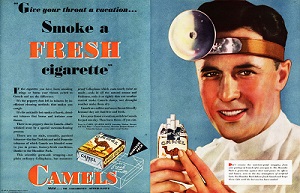By Bob Allen
Under a prevailing Premillennialist theology that holds things on Earth will keep getting worse and worse for believers until Christ returns, coupled with a Calvinism that teaches mankind is totally depraved, it is not unusual to hear in Baptist sermons examples of increasing moral laxity cited as evidence that American culture is sliding toward doom.
This weekend, however, marks the 50th anniversary of a rare instance where the “bootleggers and Baptists” phenomenon — used to describe religious people opposing alcohol sales for moral reasons joining forces with those who profit from keeping it illegal in dry counties — played out in a way that pretty much everyone agrees is for the common good.
Since the Jan. 11, 1964, U.S. Surgeon General’s Report linking tobacco use to illnesses like lung cancer and chronic bronchitis, the rate of smoking among U.S. adults has dropped from 42 percent in years preceding the report to about 18 percent today. Doctors say anti-smoking measures over the last 50 years have saved roughly 8 million U.S. lives.
 While traditional Baptist morality has lost ground in terms of social acceptance on issues including sexuality, drugs and alcohol and gambling, America is becoming increasingly smoke-free.
While traditional Baptist morality has lost ground in terms of social acceptance on issues including sexuality, drugs and alcohol and gambling, America is becoming increasingly smoke-free.
The Southern Baptist Convention passed its first anti-tobacco resolution in 1933, urging ministers, teachers and parents to “consider the probable ultimate effect of the growing and excessive use of tobacco by our boys and girls, with a view to arriving at some kind of cooperative measures by which at least some of our young people may hope to escape the experience of an habitual slavery to tobacco.”
A 1937 resolution went further, saying the prevalence of smoking among preachers, church leaders and denominational workers was “not only detrimental to the health of those who participate, but is hurtful to the cause of Christ in that it weakens the message and lowers the influence of those who are charged with the preservation and spread of the Gospel.”
The 1964 convention applauded the Surgeon General’s Report, but also took the occasion to urge President Johnson to appoint a similar commission to study the hazards of beverage alcohol. A 1969 resolution urged the curbing of advertising for both alcohol and tobacco.
A strongly worded SBC resolution on cigarette smoking in 1984 urged “our people, pastors and SBC leaders to refrain from using tobacco in any form.” It further encouraged “Southern Baptists presently engaged in the growing of tobacco, which has no use except for cigarettes and related products, to cease such agriculture and, where feasible, to switch to another cash crop in order to make such products less accessible.”
Media described the resolution, backed by Christian Life Commission head Foy Valentine, as a “war on smoking” that divided Baptists in tobacco country like North Carolina, home to more than 1 million Baptists at the time.
With the possible exception of believer’s baptism, it may be the only stance the liberal Valentine shared with his eventual successor, Richard Land, a leader in the Religious Right, who in 2009 supported legislation giving the FDA authority to regulate tobacco, joined other faith leaders in urging Major League Baseball to prohibit tobacco use at games in 2011 and wrote Congress in 2012 calling for regulation of cigars.
Even amid today’s name-calling and shouting matches of the culture wars, smoking unites religious organizations as diverse as Methodist, Presbyterian, United Church of Christ, National Council of Churches, Seventh-day Adventists, Southern Baptist Convention, Reform Judaism, Church of the Brethren and Islamic Society of North America in a national campaign called Faith United Against Tobacco.
Studies show that people who regularly attend worship services are less likely to smoke, but among various denominations the smoking rate is highest for Baptists.
Last year the smoking rate for U.S. adults dipped to 18 percent after hovering around the 19 percent to 21 percent range for most of the previous decade.
“We are a long way from the end game on tobacco use,” Thomas Novotny, professor of global health at San Diego State University, said in a June 18, 2013, story in USA Today. “It is too early to declare victory.”
Today nearly 1,200 college and university campuses are smoke-free. Golden Gate, Midwestern, Southeastern, Southern and Southwestern seminaries all ban tobacco anywhere on campus.
Moody Bible Institute recently made news when it dropped its ban on alcohol and tobacco consumption by faculty and staff, reflecting a desire to create a “high trust environment that emphasizes values, not rules.”
